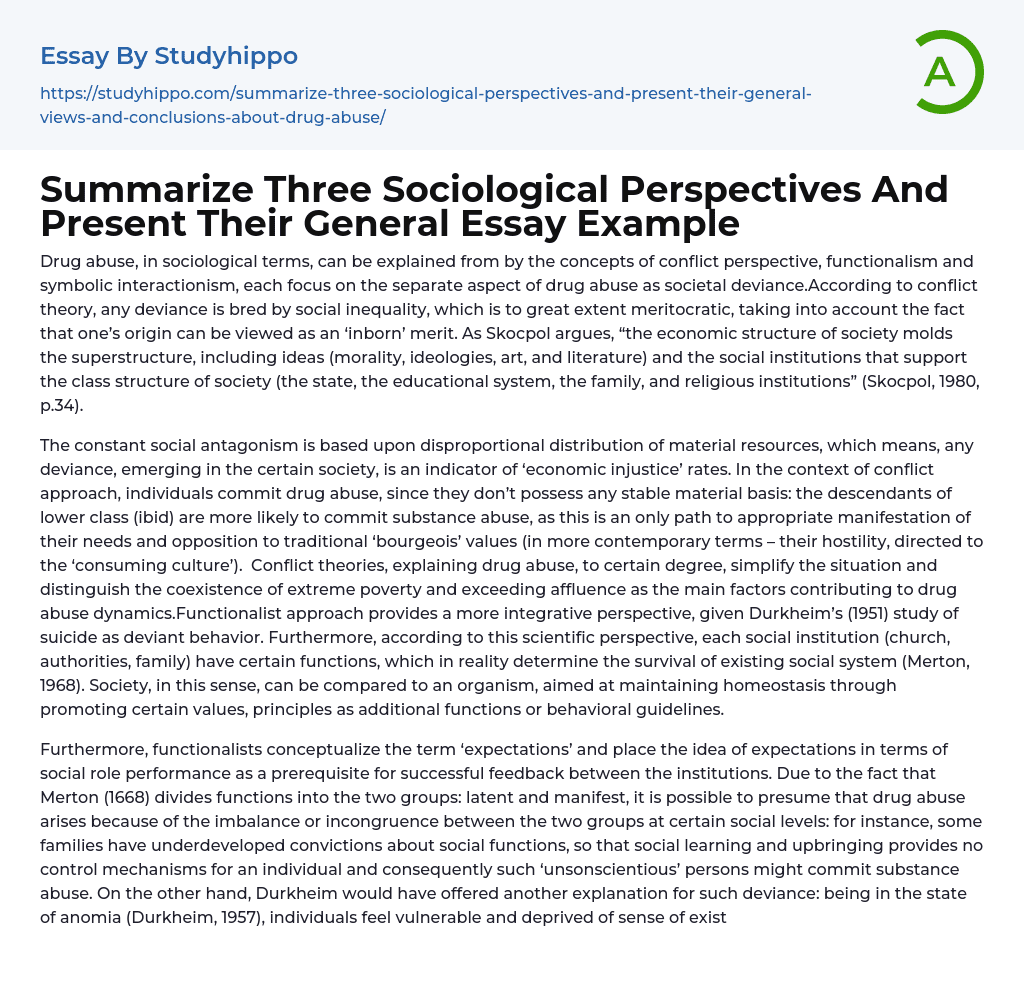

Summarize Three Sociological Perspectives And Present Their General Essay Example
Drug abuse, in sociological terms, can be explained from by the concepts of conflict perspective, functionalism and symbolic interactionism, each focus on the separate aspect of drug abuse as societal deviance.According to conflict theory, any deviance is bred by social inequality, which is to great extent meritocratic, taking into account the fact that one’s origin can be viewed as an ‘inborn’ merit. As Skocpol argues, “the economic structure of society molds the superstructure, including ideas (morality, ideologies, art, and literature) and the social institutions that support the class structure of society (the state, the educational system, the family, and religious institutions” (Skocpol, 1980, p.34).
The constant social antagonism is based upon disproportional distribution of material resources, which means, any deviance, emerging in the certain society, is an indicator of ‘economic injustice’ rates. In the context of conflict approach, indivi
...duals commit drug abuse, since they don’t possess any stable material basis: the descendants of lower class (ibid) are more likely to commit substance abuse, as this is an only path to appropriate manifestation of their needs and opposition to traditional ‘bourgeois’ values (in more contemporary terms – their hostility, directed to the ‘consuming culture’). Conflict theories, explaining drug abuse, to certain degree, simplify the situation and distinguish the coexistence of extreme poverty and exceeding affluence as the main factors contributing to drug abuse dynamics.Functionalist approach provides a more integrative perspective, given Durkheim’s (1951) study of suicide as deviant behavior. Furthermore, according to this scientific perspective, each social institution (church, authorities, family) have certain functions, which in reality determine the survival of existing social system (Merton, 1968). Society, in this sense, can be compared to an organism,
aimed at maintaining homeostasis through promoting certain values, principles as additional functions or behavioral guidelines.
Furthermore, functionalists conceptualize the term ‘expectations’ and place the idea of expectations in terms of social role performance as a prerequisite for successful feedback between the institutions. Due to the fact that Merton (1668) divides functions into the two groups: latent and manifest, it is possible to presume that drug abuse arises because of the imbalance or incongruence between the two groups at certain social levels: for instance, some families have underdeveloped convictions about social functions, so that social learning and upbringing provides no control mechanisms for an individual and consequently such ‘unsonscientious’ persons might commit substance abuse. On the other hand, Durkheim would have offered another explanation for such deviance: being in the state of anomia (Durkheim, 1957), individuals feel vulnerable and deprived of sense of existence (values, norms), so that they seek a substitute for the philosophy of life in the idea of drug-related crime.Symbolic interactionism, introduces en entire realm of contexts and hypercontexts, in which individuals easily operate.
In fact, society imposes certain roles to individuals: “Role-taking is a key mechanism of interaction, for it permits us to take the other's perspective, to see what our actions might mean to the other actors with whom we interact” (Goffman, 1958, p.251), whereas role-making points to the person’s awareness of the situation so that he or she can create appropriate roles. In terms of symbolic interactionism, drug abuse is rooted in the improvisational nature of social interactions: certain individuals manage to socialize and participate in social life through following time-honored roles (‘golden son’, ‘reliable employee’), and creating new ones
through the life course, whereas others are excluded from society only because they misunderstand, misinterpret or avoid following certain roles – and automatically become regarded as socially disobedient. The views on drug vary among societies, and it is commonly known that in America we speak mostly about ‘drug abuse’, which points to the fact that individuals, engaged into such criminal activity, are incapable of penetrating into the depth of social symbolism or ignore certain roles and values.To sum up, whereas conflict theory provides collectivistic approach to drug abuse, both functionalism and symbolic interactionism imply the individuation of the issue: the criminals either experience anomia, the disappearance of well-established values (Durkheim, 1957) or fail to meet certain role criteria.
- Values of Life essays
- Ethical dilemma essays
- Normative Ethics essays
- Virtue Ethics essays
- Belief essays
- Deontology essays
- Moral essays
- Virtue essays
- Work Ethic essays
- Acceptance essays
- Age Of Enlightenment essays
- Child Observation essays
- Confucianism essays
- Conscience essays
- Critical Reflection essays
- Destiny essays
- Determinism essays
- Empiricism essays
- Environmentalism essays
- Epistemology essays
- Ethics essays
- Ethos essays
- Existence essays
- Existentialism essays
- Fate essays
- Free Will essays
- Functionalism essays
- Future essays
- Good And Evil essays
- Human Nature essays
- Individualism essays
- Meaning Of Life essays
- Metaphysics essays
- Natural Law essays
- Personal Philosophy essays
- Philosophers essays
- Philosophy Of Life essays
- Political Philosophy essays
- Pragmatism essays
- Reality essays
- Relativism essays
- Teaching Philosophy essays
- Time essays
- Transcendentalism essays
- Truth essays
- Utilitarianism essays
- Adaptation essays
- Adventure essays
- Adversity essays
- Aging essays



